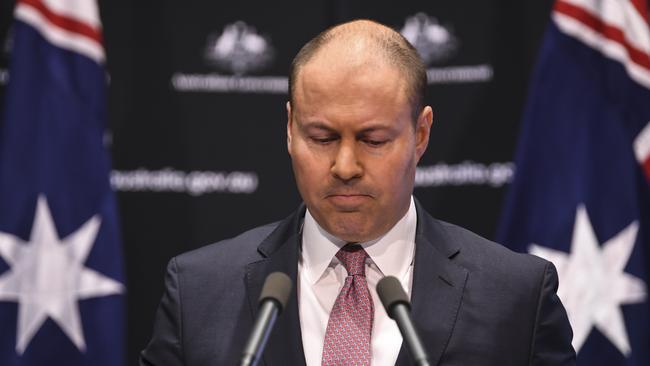Australia enters recession, economy shrinks in first quarter of 2020
Australia has slipped into recession, with the cost of coronavirus and Australia’s devastating bushfire season biting. Here an expert reveals what it means for you and your money.
Business
Don't miss out on the headlines from Business. Followed categories will be added to My News.
With Australia falling into recession money expert Roger Montgomery explains what it means for you and your money.
What exactly is a recession?
It means the economy that is measured by its output has gone backward for two consecutive quarters.
How long will this last?
Globally, the average recession has lasted 18 months. The average of the last 39 American recessions since 1836 have lasted one year and eight months, the shortest recession has been four months and the longest has been a decade. So somewhere within those time frames will be the end of our recession. Everything we see the government and Reserve Bank of Australia doing is an attempt to reduce the severity and duration of the recession.
What does the government need to do?
The second and third largest employment groups in Australia are the retail and construction sectors.
Giving money, literally, to people to build houses would increase the demand in housing construction and keep construction workers working and earning money.
Similarly, handing money to smaller and medium business operators, particularly those in retail, could give them some confidence to employ some more people in their shops.
What should individuals be doing during this time?
When the last recession happened, interest rates were much higher than they are today so having debt was bad. With lower interest rates today, debt is not such a burden unless — you have lost your job.
Cash is still king and it gives you flexibility and helps you survive a recession. There is probably several generations of Australians who have never seen a recession and do not know how bad it can get.
Many past mistakes during recession will be made again like spending too much money or borrowing too much money
So avoid that and do not get tempted by the sales and do not go broke saving money. Because there will be a lot of retailers now trying to sell that old stock they did not sell during the coronavirus at very tempting discounts.
Roger Montgomery from Montgomery investment
AUSTRALIA ENTERS RECESSION, BUT WORST YET TO COME
The coronavirus crisis has officially ended Australia’s world-beating 29-year run of uninterrupted economic growth.
Treasurer Josh Frydenberg confirmed on Wednesday that the nation was now in recession for the first time since 1991, after the economy shrunk by 0.3 per cent in the first three months of the year.
The figures for the June quarter — when lockdown measures closed large parts of the economy — will be even worse, but Mr Frydenberg said Australia had dodged a predicted economic crash of more than 20 per cent.
“This was the economists’ version of Armageddon,” he said. “We have avoided the economic fate, and the health fate, of other nations because of the (government support) measures.”
Mr Frydenberg will deliver what looms as mini-Budget next month, including a likely revamp of the $70 billion JobKeeper program which is supposed to subsidise the wages of 3.5 million workers until the end of September.
A forecasting bungle meant the scheme’s cost was slashed from $130 billion, ramping up the pressure on the government to extend it for hard-hit industries including tourism and hospitality and expand it to some workers who have missed out.

Mr Frydenberg said the government was investigating “where businesses are at in the recovery stage” and would have a clearer picture of the state of the economy by July.
“We want to understand whether the (JobKeeper) quantum — that $1500 payment — continues to be the right amount,” he said.
Australian Bureau of Statistics data showed Australia’s economy grew by just 1.4 per cent in the year to the end of March.
ABS chief economist Bruce Hockman said it was the slowest growth rate since the Global Financial Crisis.
The quarterly figures included the impact of the summer bushfires and the start of COVID-19 restrictions, including a ban on travellers from China.
Experts anticipate the economy will shrink by a massive 8.5 per cent in the June quarter, confirming the recession, after almost 600,000 Australians lost their jobs in April.
AMP Capital chief economist Shane Oliver said the looming hit may not be as bad as forecast as the economy was “reopening at a faster than expected pace”.
ANZ senior economist Felicity Emmett said while optimism was growing that the peak-to-trough hit to economic growth would be shallower than first forecast, a so-called V-shaped recovery was unlikely. “Data continues to suggest a sharp drop in activity,” she said.
IFM Investors chief economist Alex Joiner said while the worst of the downturn was yet to be officially recorded in the national accounts, Australia’s performance to date was enviable by global standards.
In the first three months of the year, China’s economy shrunk 9.8 per cent, France went backwards by 5.3 per cent while Britain saw a fall of 2 per cent in its economy.
Australia had knocked off the Netherlands in 2017 to record the longest recession-free period in the developed world.
Federal Shadow Treasurer Jim Chalmers said the data showed the economy was struggling before the pandemic, which had “accelerated longstanding economic challenges under the Liberals”.
Household discretionary spending was down 3.9 per cent in the first three months of this year.
But government spending on social assistance benefits jumped 6.2 per cent as payments to fire-hit areas and initial coronavirus relief measures were rolled out.
Total demand in Victoria went backwards for the second consecutive quarter, which Victorian Shadow Treasurer Louise Staley said meant the state was already in recession, although the ABS is yet to release this year’s gross state product figures.
MORE BUSINESS NEWS:
